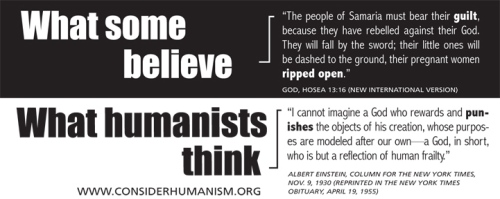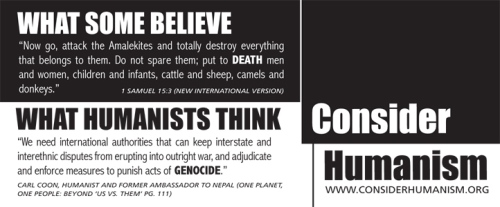| The following item was originally posted in November 2010, and I have added it to my blog recycling program. Because I have new readers of The GeoChristian, I will occasionally go back and re-use some of my favorite blog entries.
Yesterday, I wrote about a new advertising campaign from Answers in Genesis. In this present entry, I’ll take a look again at an advertising campaign sponsored by the American Humanist Association. I have done a little editing to improve the article. |
The American Humanist Association is launching an ad campaign [in 2010], urging us all to “Consider Humanism.” I can summarize the logic of their ad campaign with one word: Nonsense!
This campaign uses a familiar atheist technique: Focus on the evils done in the name of religion; ignore the evils done by atheists.
The graphics I’ve seen have this format:
- What some believe — a verse from the Bible or Koran urging some repugnant thing, such as slaughtering, hating, oppressing, and so forth.
- What humanists think — a quote from some “enlightened” atheist showing how far we’ve come from the barbaric days of the Bible and Koran.
Note that religious people just “believe” something, whereas humanists/atheists “think.”
I am not a Muslim, obviously, so I’ll leave it to Muslims to defend themselves against the humanists.
There is a good, well-thought-out answer—yes, we Christians know how to think—for each of the accusations that the humanist ad campaign levels against Christianity. Consider the following ad:
This one is rather silly. Does any Christian really think that Jesus, in this passage, was telling us to hate anyone? Jesus was clearly using hyperbole, as we are told over and over to love one another, and even to love our enemies. Jesus wants our love for him to be so great that all other loves—including our love for ourselves—pales in comparison.
I’ll take Katharine Hepburn’s word for it, that she believes (that must have been a typo on the humanists’ part) that we should be kind to one another. I have to wonder, however, whether that belief comes from the Anglo-Saxon side of her cultural heritage, or from the Christian side.
Here’s another:
The Bible paints things as they really are. The people of Samaria (the northern ten tribes of Israel) had adopted a religious system from the surrounding nations—including worship of Baal and Molech— that included ritual prostitution (probably involuntary for many of the prostitutes), human sacrifice, mutilation, and incest. The humanists seem to think that God was being rather harsh in sending judgment on all of this, but most of us can discern that something is horribly wrong in a religious system that encourages ritual sacrifice of children.
Albert Einstein may have been guilty of exactly what he said he opposed. He could not imagine a God who punishes, saying this is “but a reflection of human frailty.” But then isn’t the God whom he could imagine one modeled after Einstein’s own thoughts in some way?
It wouldn’t be fair for me to pick out the easiest ads—and I think the first two I mentioned were incredibly easy to answer—so I’ll go for what I think is the most difficult:
I’ll start with the atheist/humanist solution that is proposed, and then get to a Christian response.
First, I applaud those who work towards peace, whether they be humanist, Buddhist, Hindu, Muslim, or Christian. I am not opposed to international efforts to prevent genocide.
Having said this, I wouldn’t trust atheists (whether they call themselves “atheists” or “humanists”) to run an international organization that would “adjudicate and enforce measures to punish acts of genocide.” The atheist track record in the past century is one of massive genocide (Stalin, Mao, etc.), and it would be easy for them (or any other group) to start favoring one side over the other in a conflict. Human nature has embedded within it characteristics such as greed, fear, and aggression, and too much power in the hands of one group always ends up in disaster. Christianity recognizes this. Most humanists, on the other hand, put too much trust in the ever-elusive perfectibility of the human species.
Genocide is quite simply wrong. I can say that as a Christian who believes in objective morality. I believe that the atheists/humanists ultimately have no absolute reason for saying it is wrong—right and wrong are at best social constructions to them—but I take them at their word that they really do believe for some reason that genocide is wrong.
Genocide certainly goes against all of the ethical teachings in the New Testament, and most of the ethical teachings of the Old Testament. But what about instances in the Old Testament where God told his people to fight wars, and to wipe out every man, woman, and child? This is a legitimate issue to raise, as mass extermination of humans—the holocaust, and the genocides in Cambodia, Rwanda, and Bosnia—is a great evil. From a Christian perspective, it is good to keep the following in mind:
- God is the maker and ruler of all. He has the absolute right of ownership over all peoples. If he judges an individual or a whole tribe before the final judgement, he is within his rights to do so.
- The Canaanites were exceedingly wicked: human sacrifice and so forth. God could have judged them by sending a plague or famine, but in this case he used an army.
- All are sinners and deserving of God’s judgment. This goes for everyone from Adolf Hitler to Mother Theresa. The judgment on the Canaanites is therefore a brief picture of what all sinners deserve.
- The commands given in the Old Testament for military campaigns were extremely limited in their scope. These commands were for the conquest of Canaan, and not given as a general command for how Israel should interact with its neighbors.
- God is just. The same severe penalty given to the Canaanites (destruction) was later mandated for Israelites who followed false Gods (see what I wrote about the judgment on the Israelites in Samaria up above).
- Grace was shown to repentant Canaanites, such as Rahab and her family.
- We now advance the Kingdom of God through acts of love and proclamation of Christ.
This is an answer that I find satisfactory. Genocide is evil, and there is nothing in the Bible to justify it or even to suggest that it is an acceptable action for us to engage in.
If you are a Christian, do not be duped by the “logic” and “reason” of the atheists in their ad campaign. Their arguments are not as reasonable and logical as they make them out to be.
If you are a humanist/atheist, I urge you to consider Christianity as a better explanation for the world and human nature, including morality and ethics. This ad campaign by the American Humanist Association was downright silly, and demonstrated that their rejection of Christianity has an irrational side to it. Christianity, in contrast to atheism, offers a solid foundation for both reason and morality.
Grace and Peace



